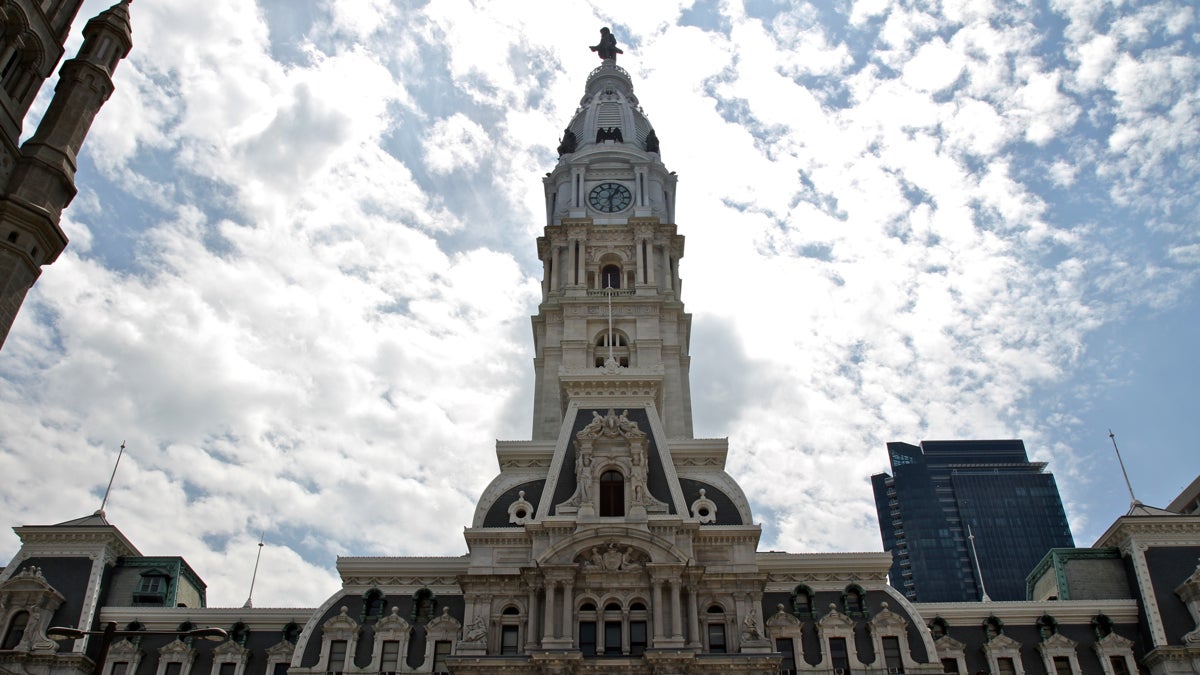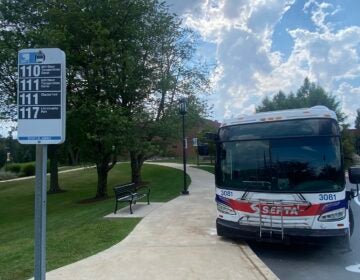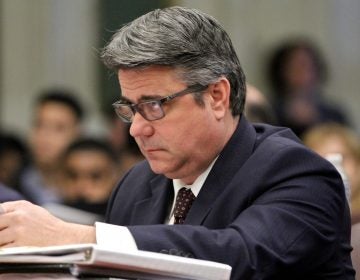A retrospective: What passed muster with City Council, and what didn’t
With the council on its summer recess, here's a rundown of all the bills PlanPhilly covered during the spring session and where each currently stands.

Philadelphia's City Hall Tower (Emma Lee/WHYY)
This story originally appeared on PlanPhilly.
—
It’s easy to keep track of big-ticket items — like the capital budget or this year’s construction tax — during the course of a City Council session, but many legislative matters don’t enjoy that kind of sustained attention.
With the council on its summer recess, here’s a rundown of all the bills PlanPhilly covered during the spring session and where each currently stands.
ANTI-SQUATTING BILL
Republican Councilman at-large David Oh has been giving speeches on the evils of squatting since the first day of 2017’s fall session. Back then, his effort became the rare City Council bill that received a hearing but failed to secure the votes to make it out of committee. This spring, Oh enjoyed better luck with his law-and-order pitch, despite lacking data to prove how widespread the problem actually is in Philadelphia. Further, the latest version of the measure did not substantively alter the previous failed iteration, which critics said was largely unenforceable except for some provisions that could make it easier for abusive landlords to evict tenants.
Most bills that make it to a final vote pass the 17-member council unanimously, but Oh ’s received “no” votes from President Darrell Clarke, Helen Gym, Curtis Jones, Blondell Reynolds Brown, and Cherelle Parker — who delivered a 30-minute filibuster-style speech against it.
Council sources say Mayor Jim Kenney is not expected to sign the legislation until the fall.
INCLUSIONARY ZONING
Councilwoman Maria Quiñones Sánchez kick-started City Council’s policy conversation around affordable housing last June, when she introduced a mandatory inclusionary zoning bill. After six months of debate, that initiative went down to defeat. This spring, it was resurrected as a massive expansion of the city’s existing voluntary inclusionary zoning bonus. The new bill allows developers to build taller and denser buildings in many more parts of Philadelphia, including most multifamily districts while requiring them to pay far less into the city’s Housing Trust Fund than the previous bonus required.
The bill provides an option for building affordable units on site. But it also allows developers to win zoning bonuses by paying 1 percent to 2 percent of the building costs into the Housing Trust Fund, with more generous bonuses granted for the higher payments. That’s substantially less than was required under the other, previously existing, bonus system. Consider One Water Street, whose developer famously decided to pay into the trust fund at the last minute instead of building affordable units on site. In that case, under the only inclusionary zoning bonus, the developer paid $3.75 million to the trust fund. Under the new legislation, the developer would have had to pay only $1.3 million for the more generous bonus, or $650,000 for the less generous.
The bill passed the council unanimously on the final day of the spring session, and the mayor is expected to sign it soon.
SMOKE ALARMS FOR ROOMING HOUSES
After a deadly fire killed four people in an illegal rooming house in North Philadelphia, City Council promised an array of legislation to address unsafe conditions in such places, which typically operate in the shadows. But the only reform introduced was a bill to require interconnected smoke detectors in boarding houses. Since the vast majority of these establishments already operate off the books— only 82 have been legally established since 2006 — the bill will have limited effect. It is currently sitting on Mayor Kenney’s desk.
More ambitious reform efforts promoted by Licenses and Inspections Commissioner Dave Perri, which would make it easier to establish rooming houses, have not been taken up by the council.
CALLOWHILL BUSINESS IMPROVEMENT DISTRICT
The bill is on Kenney’s desk and is expected to be signed. But it does not legally establish the district. Instead, the legislation allows the development forces behind the proposed BID, led by Craig Grossman’s Arts and Crafts Holdings, to begin a public process aimed at convincing the affected property owners.
PROPERTY-TAX ABATEMENT REFORM
Councilwoman Gym tried to jump-start a conversation about changing the generous 10-year property-tax abatement for new construction by introducing a bill that would exempt from the abatement the 55 percent of every property-tax dollar that goes to the Philadelphia School District. The bill was pulled from committee before it received a hearing, but abatement reform is widely expected to be on the agenda in the fall — especially after building-trades union leader John Dougherty endorsed the idea.
BILLBOARD NEXT TO FAIRMOUNT PARK
When Children’s Hospital of Philadelphia employees complained about a billboard blocking the view from the new Roberts Center for Pediatric Research, the billboard company agreed to find another location for it. The new site it chose overlooked the Schuylkill Expressway and was separated from Fairmount Park by a just narrow strip of land, provoking massive controversy.
In the end, sponsor Curtis Jones agreed to pull the bill because his old boss, former Mayor Bill Green, came to the council’s chambers and “took me to the woodshed.”
WISSAHICKON CONSERVATION OVERLAY
A measure that would create a conservation district dictating the form of new construction in the city’s Wissahickon neighborhood is expected to soon be law.
MANDATED PROPERTY APPRAISALS
Councilman Allan Domb’s bill calling for appraisals of sales or purchases of real estate worth more than $200,000 by the City of Philadelphia is now law.
FRANCISVILLE REMAPPING
Zoning-remapping legislation that stirred massive controversy in the city’s Francisville neighborhood is now on Kenney’s desk.
NORTHERN LIBERTIES BUSINESS IMPROVEMENT DISTRICT
The enabling legislation for this new BID passed in early June, and it is now law.
FIFTY MILLION DOLLARS FOR THE HOUSING TRUST FUND
Remember when Councilman Oh introduced legislation requiring the city to find $50 million annually for the miniscule Housing Trust Fund? Neither does anyone else. (It never even got to committee.)
KEEP BARS OPEN UNTIL 4 A.M., FOR THE CHILDREN
Councilwoman-at-large Reynolds Brown has repeatedly tried to keep bars open later, so the city can earmark tax dollars from sales at those times to the school district. She tried again this year, but the proposal again went nowhere.
GIVING POWER OVER TAX ASSESSMENTS TO CITY COUNCIL
After tax reassessments took many property owners by surprise, Oh tried to give the city’s legislative body the power to approve, or not, any increase above the rate of inflation. As Drexel University real estate observer Kevin Gillen warned, politicizing the assessment process is an idea from the bad old days: “Many Pennsylvania municipalities have a long and storied history of using the assessment process to reward neighborhoods that vote for the party in power and punish those that don’t.”
Apparently, Oh’s colleagues agreed. Co-sponsor Domb soon asked for his name to be removed from the legislation, and the bill never made it out of committee. Instead, City Council will be auditing the Office of Property Assessment.
SPOT ZONING IN UNIVERSITY CITY
In April, Councilwoman Jannie Blackwell tried to change the zoning of a parcel containing an isolated and vacant motel with no pedestrian access, to allow the construction of a skyscraper. The land belongs to Philadelphia Suburban Development Corp., which Blackwell said wanted to donate the parcel to the University of Pennsylvania. The Philly Declaration later reported that the company donated $5,000 to Blackwell’s campaign a month before the bill was introduced. Blackwell later told PlanPhilly she scrapped the bill. “I got a call from Penn saying they didn’t know anything about it, so how can I call myself giving respect to Penn and they knew nothing about it? So I dropped it.”
NEW KEYSTONE OPPORTUNITY ZONES
At one of the shortest hearings of the City Council session, the Finance Committee approved 81 sites for tax-free Keystone Opportunity Zones covering a total of 93.7 acres. No further action was taken this session, but the bill will have to be wrapped up before the state deadline for new KOZ considerations, Oct. 1.
LAND BANK BALLOT QUESTION
At the first session of the spring, Council President Clarke introduced legislation to shift more power over the Land Bank to City Council. The legislation seemed designed to get the Kenney administration’s attention. Perhaps coincidentally, the mayor’s budget proposal included funding for Land Bank operations, and Clarke’s bill never received a hearing.
JUST-CAUSE EVICTION
In October, Councilman Jones surprised tenant advocates, landlords, and fellow council members when he introduced legislation that would require property owners to have a “just cause’ before evicting a renter. Such legislation is usually paired with rent control, which Jones said he would never support, but both landlord and tenant groups saw it as the thin edge of the wedge toward such a policy. Regardless, the bill would do little to help most of those who end up evicted in Philadelphia because they usually do have what is considered a “just cause’ under the legislation’s terminology — they cannot afford to pay their rent.
After its sudden introduction, the bill languished before getting a hearing in February. Then it languished again, with a final vote said to have been scheduled for the last day of the spring session. Instead, it was held again, with Jones’s office saying further discussions would occur over the summer.
INSURANCE FOR RCOS
Ever since the city created Registered Community Groups during zoning reform in 2012, these specially empowered neighborhood groups have been clamoring for some kind of municipally supported Director and Operating insurance to protect them from Strategic Lawsuits Against Public Participation (SLAPP). When several prominent community groups almost voted themselves out of existence last year after being named in lawsuits, Councilman Bobby Henon introduced legislation to provide funding for insurance policies.
But the Kenney administration wanted more time to flesh out the bill, which was light on specifics, so after it passed out of the Rules Committee, Henon agreed to not advance it until amendments are ready in the fall.
RCO NOTIFICATION
Neighbors always argue that they are not given enough notification about development projects near them. Last year, Councilwoman Parker tried to address the issue by introducing legislation mandating Project Information Forms to better educate neighbors. This year, Councilwoman Cindy Bass tried legislation of her own.
The original bill was expansive to the point of being unworkable, mandating too many new, exceedingly broad duties for government agencies without providing resources to pay for them. The Planning Commission put the bill on 45-day hold as a result, and amendments lowered the burden of a costly mailing requirement. But city planners, developers and, quietly, other council members continued to express doubts about the bill, which could add hundreds, if not thousands, of dollars to the cost of even small projects, like roof decks, that require variances. The bill was amended again on the last day of the spring session to further moderate it, narrowing the number of projects affected to those with at least 2,500 feet of gross floor area (thus exempting smaller projects). It remains to be seen whether the unfunded mandates in the bill will be moderated.
MANDATORY PARKING MINIMUMS
Since Philadelphia reduced its mandatory parking minimums during 2012’s zoning reform, City Council members, led by Clarke and Blackwell, have been trying to reverse course. This year, Blackwell resurrected a bill she introduced in 2016 that would double parking requirements in most parts of the city. Her bill was functionally replaced at a May Rules Committee hearing with a more moderate version based on reforms Clarke’s office had been working on. But that version still sharply increased parking requirements in formerly industrial areas, along neighborhood commercial corridors, and in areas zoned for small to medium-size apartment buildings.
Even the scaled-down bill proved to be too unpopular — many community associations, real estate developers, and affordable-housing groups oppose the idea — and it was held before it could be heard by the Rules Committee. At the time, Blackwell told PlanPhilly she was holding it because Quiñones-Sánchez had issues with the legislation. (From an informal poll taken of other members at the time, she wasn’t the only one). Now a compromise is in the works, so it looks like some version of a mandatory minimum parking bill will be on the agenda again in the fall.
TRANSIT ORIENTED DEVELOPMENT OVERLAYS
Back in January, Quiñones-Sánchez introduced legislation that would allow developers to build denser and taller buildings around four El stops on the Market-Frankford Line. Despite receiving uniform endorsement from the Planning Commission and unanimous approval by the Rules Committee, the bill remains in limbo.
Contacted for comment, Quiñones-Sánchez told PlanPhilly that she is actively working on a compromises to ensure the parking bill is appropriate for her district and “didn’t want to send mixed messages as we do.” At another point, Quiñones-Sánchez said she also wants to bring smaller units and ground-floor residential to buildings around the El stops. Her office said that those considerations have delayed this most ambitious utilization of the city’s transit-oriented development overlay, but that it isn’t dead.
TEMPLE’S FOOTBALL STADIUM
Near the beginning of the council session, Temple University announced it would be moving forward with its plan to build a football stadium in the middle of North Philadelphia. Neighbors were not amused. Temple required a handful of bills from City Council to move forward, but Council President Clarke said he would sit back and let the school hammer out a deal with neighbors before he introduced anything. Instead, the university managed to bungle the rollout and irritate opponents to such an extent that Clarke came out firmly against the project, at least for now. At the final council session, Clarke even delayed a vote on a bill to pave the way for a early chilhood educationcenter the university hoped to offer as an olive branch.
LONGTIME OWNER OCCUPANTS PROGRAM EXPANSION
The 2014 LOOP law was designed to offer property-tax relief to longtime, low-income homeowners reeling from the spikes in home valuations that followed former Mayor Michael Nutter’s Actual Value Initiative, which attempted to bring assessments up to date after years of neglect. Participants in LOOP had to had lived in their home at least 10 years, earned below 150 percent of area median income ($83,200 for a family of four), and experienced a value increase of at least 300 percent in one year.
The Philadelphia Federal Reserve recently highlighted the policy as a successful attempt to blunt displacement, but LOOP’s relief lasted only 10 years. During the spring session, Councilman Kenyatta Johnson introduced legislation to scrap that 10-year limit. Although the Kenney administration asked that the limit be eliminated only for those making less than 120 percent of area median income, the bill was passed and signed into law without amendment.
WHYY is your source for fact-based, in-depth journalism and information. As a nonprofit organization, we rely on financial support from readers like you. Please give today.







